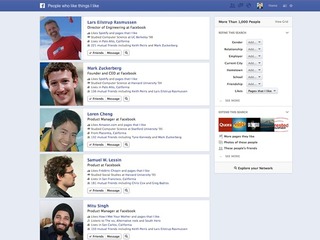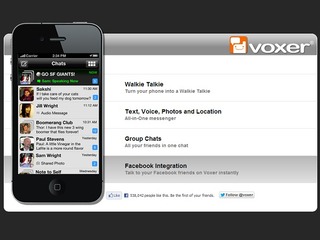M&A activity in the warehouse robotic space
Robots are taking over the heavy lifting work inside warehouses
Read more...
(Updated to reflect comment from Facebook and Twitter)
Remember last week, when Facebook decided to cut off mobile communications service Voxer from being able to access Facebook's friend data, citing Voxer as a competing social network?
Well, the world's largest social network showed that it was not kidding around, cutting off access to its friend data to two new apps on Thursday, both on the same day that they launched.
One of the apps that has been cut off is Twitter's newly released Vine app, which allows users to create and share six second long looping videos that can be embedded into tweets, or uploaded onto a separate Vine web page.
Shortly after the launch, users began to get a messages like this one, which was tweeted to The Verge, telling them that they are "not authorized" to sync the app up to their Facebook friends:

Facebook has also cut off access to Yandex's new app called Wonder, which also launched Thursday, it has been confirmed to VatorNews. The app allows users to ask questions regarding their friends' social network data.
"Wonder app has been blocked by Facebook. We are in touch with Facebook to figure out on reasons and ways to solve the problem," a Yandex spokesperson said.
As of right now, any new Wonder user who is trying to sign up with their Facebook's account in Wonder gets the notification by Facebook saying "An error occurred. Please try again later." Users who have already signed up can still ask questions regarding their Facebook friends. but the Facebook data will not be updated.
Instagram, Foursqure and Twitter data are being updated normally, Yandex says.
"We don't have anything to share beyond the notification that's in the app," a Twitter spokesperson told VatoNews.
Why cut off access?
When it was revealed that that Facebook had blocked Voxer, it was reported that the social network had cited violations of a section of the company’s terms of service.
Here is the section in question:
"Competing social networks: (a) You may not use Facebook Platform to export user data into a competing social network without our permission; (b) Apps on Facebook may not integrate, link to, promote, distribute, or redirect to any app on any other competing social network," the policy says.
Now, we don't know if this is the same section that Facebook used as justification for blocking Vine and Wonder from accessing its social graph, but it is easy to see how Facebook could see Wonder as a competitor, given that the app essentially does the exact same thing as Facebook's recently launched Graph Search.
Here is how Yandex described what the app does on its blog Thursday:
"To help ourselves retrieve interesting bits from our social networking space, we have built an app for iPhone and iPod Touch that can respond to our questions using the information about our friends’ activity on Facebook, Instagram, Foursquare and Twitter – places they visited, music they listened to, or news they read – and called it Wonder," Yandex wrote.
It is harder to see how Facebook could say the same thing about Vine, though.
Facebook Messenger has video calling, and the social network did recently release its Poke app, which allows users to send each other video messages, but the point of that app is for the videos to automatically delete after a short period of time. Unless I am missing something, Facebook does not seem to have anything similar to Vine that it is competing with.
What seems more likely is that this is another step in the war between the social networks that has been going on for the last six months or so, in which they have begun to cut each other off from their own data.
First, Twitter pulled tweets off of LinkedIn in August, then, in December, Instagram, which is owned by Facebook, disabled photo integration with Twitter, making it so that its that photos would not show up in tweets at all, and instead will link back to Instagram.com.
It seems likely that Facebook simply did not want to allow users to put videos up on its site that would link back to Twitter. And, on a certain level, that is understandable. Keeping users from linking to competitors is good for the social networks in the short term, as so many of them relying heavily on advertising, which means they need eyeballs and clicks. Ultimately, though, I think the networks will probably suffer in the long term, as will the user, if they keep going down this road.
I understand that these are companies that need to make money, especially Facebook since it is now a public company and has investors to appease. I get that they simply cannot go around giving away data for free. But, at the same time, social networks were also supposed to make the Internet a more open place, where people could freely find each other and easily share things about themselves. That only works if users can take their information and freely spread is across a variety of networks. The more the social networks start cutting each other out, the further away the user gets from being able to achieve that dream.
Update:
Facebook has written a blogpost Friday to clarify the situation. Here is the post in full:
"Over the past few days, we’ve received questions about a few of our platform policies and want to clarify our thinking.
For the vast majority of developers building social apps and games, keep doing what you’re doing. Our goal is to provide a platform that gives people an easy way to login to your apps, create personalized and social experiences, and easily share what they’re doing in your apps with people on Facebook. This is how our platform has been used by the most popular categories of apps, such as games, music, fitness, news and general lifestyle apps.
For a much smaller number of apps that are using Facebook to either replicate our functionality or bootstrap their growth in a way that creates little value for people on Facebook, such as not providing users an easy way to share back to Facebook, we’ve had policies against this that we are further clarifying today (see I.10).
We are committed to helping you build great apps with Facebook, and will continue to invest in products that help you succeed while creating a healthy ecosystem."
Facebook policy I.10 says the following:
"Reciprocity and Replicating core functionality: (a) Reciprocity: Facebook Platform enables developers to build personalized, social experiences via the Graph API and related APIs. If you use any Facebook APIs to build personalized or social experiences, you must also enable people to easily share their experiences back with people on Facebook. (b) Replicating core functionality: You may not use Facebook Platform to promote, or to export user data to, a product or service that replicates a core Facebook product or service without our permission."
(Image source: https://www.outsideline.co.uk)
Robots are taking over the heavy lifting work inside warehouses
Read more...The company also expanded access to 12 different provider types for male fertility care
Read more...Ezra's AI cancer screening platform will be available in 150 RAYUS locations
Read more...




